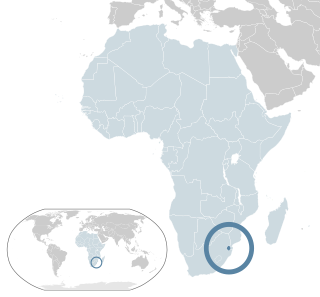
Eswatini, formally the Kingdom of Eswatini, also known by its former official name Swaziland and formally the Kingdom of Swaziland, is a landlocked country in Southern Africa. It is bordered by Mozambique to its northeast and South Africa to its north, west, south, and southeast. At no more than 200 km (120 mi) north to south and 130 km (81 mi) east to west, Eswatini is one of the smallest countries in Africa; despite this, its climate and topography are diverse, ranging from a cool and mountainous highveld to a hot and dry lowveld.
The economy of Eswatini is fairly diversified. Agriculture, forestry and mining account for about 13 percent of Eswatini's GDP whereas manufacturing represent 37 percent of GDP. Services – with government services in the lead – constitute the other 50 percent of GDP.
The Umbutfo Eswatini Defence Force (UEDF) is the military of the Southern African Kingdom of Eswatini (Swaziland). It is used primarily during domestic protests, with some border and customs duties; the force has never been involved in a foreign conflict. The army has struggled with high rates of HIV infection. Since measures were put in place the rate is dropping.

Eswatini is a member of the United Nations, the Commonwealth of Nations, the African Union, the Common Market for Eastern and Southern Africa, and the Southern African Development Community. Currently, the Kingdom of Eswatini maintains 11 embassies and High Commissions along with 15 consulates and other representations around the world, while there are five embassies and High Commissions in Eswatini as well as 14 consulates and other representations.

Mbabane is the most populous city in Eswatini, and is one of the two capitals, serving as the executive capital.
The Eswatini national football team, nicknamed Sihlangu Semnikati, represents Eswatini, formerly known as Swaziland, in international football and is controlled by the Eswatini Football Association. It has never qualified for the World Cup or the Africa Cup of Nations finals. Swaziland's best performance in an international tournament is a semi-final finish in the COSAFA Cup.

Lesbian, gay, bisexual, transgender, and queer (LGBTQ) people in Eswatini have limited legal rights. According to Rock of Hope, a Swati LGBTQ advocacy group, "there is no legislation recognising LGBTIs or protecting the right to a non-heterosexual orientation and gender identity and as a result [LGBTQ people] cannot be open about their orientation or gender identity for fear of rejection and discrimination." Homosexuality is illegal in Eswatini, though this law is in practice unenforced. According to the 2021 Human Rights Practices Report from the US Department of State, "there has never been an arrest or prosecution for consensual same-sex conduct."
Education in Eswatini includes pre-school, primary, secondary and high schools, for general education and training (GET), and universities and colleges at tertiary level.

Eswatini–India relations refers to the international relations that exist between Eswatini and India. India also maintains a resident High Commission in Mbabane established on 13 August, 2019. Eswatini does not have a diplomatic mission in India.
The Health Sector in Eswatini is deteriorating and four years into the United Nations sustainable development goals, Eswatini seems unlikely to achieve the goal on good health. As a result of 63% poverty prevalence, 27% HIV prevalence, and poor health systems, maternal mortality rate is at a high of 389/100,000 live births, and under 5 mortality rate is at 70.4/1000 live births resulting in a life expectancy that remains amongst the lowest in the world. Despite significant international aid, the government fails to adequately fund the health sector. Nurses are now and again engaged in demonstrations over poor working conditions, drug shortages, all of which impairs quality health delivery. Despite tuberculosis and AIDS being major causes of death, diabetes and other non-communicable diseases are on the rise. Primary health care is relatively free in Eswatini save for its poor quality to meet the needs of the people. Road traffic accidents have increased over the years and they form a significant share of deaths in the country.

The Eswatini women's national cricket team represents the country of Eswatini in women's cricket matches.

The history of the Jews of Eswatini, formerly Swaziland.
The COVID-19 pandemic in Eswatini was a part of the ongoing worldwide pandemic of coronavirus disease 2019 caused by severe acute respiratory syndrome coronavirus 2. The COVID-19 pandemic was confirmed to have reached Eswatini in March 2020.

Eswatini–Taiwan relations refer to the international relations between the Kingdom of Eswatini and Republic of China (Taiwan). Eswatini maintains an embassy in Taipei, and Taiwan maintains an embassy in Mbabane.
COVID-19 vaccination in Eswatini is an ongoing immunisation campaign against severe acute respiratory syndrome coronavirus 2 (SARS-CoV-2), the virus that causes coronavirus disease 2019 (COVID-19), in response to the ongoing pandemic in the country.

Eswatini competed at the 2020 Summer Olympics in Tokyo. Originally scheduled to take place from 24 July to 9 August 2020, the Games were postponed to 23 July to 8 August 2021, due to the COVID-19 pandemic. Previously known as Swaziland, it was the nation's eleventh appearance at the Summer Olympics since its debut in 1972. This was the first Games at which Eswatini competed under the name it assumed in 2018.
Capital punishment is a legal penalty in Eswatini, formerly known as Swaziland. Despite its legality, no executions have been carried out since 1983. Therefore, Eswatini is classified as "abolitionist in practice."






